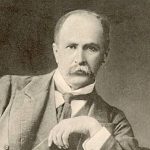Date of Birth: 1287
Zodiac Sign: Unknown
Date of Death: 1347
Biography
William of Occam, also known as William Ockham, was an English Franciscan friar, scholastic philosopher, and theologian, born in the village of Ockham in Surrey in 1287. He is most famous for Occam’s Razor, a problem-solving principle that states, “Entities should not be multiplied beyond necessity.” This principle advocates for simplicity in explaining phenomena and has had a profound impact on modern scientific methodology. William was educated at the University of Oxford, where he likely studied theology and philosophy. However, he never completed his master’s degree, which did not prevent him from becoming a significant figure in the intellectual circles of his time. His work primarily focused on logic, metaphysics, and epistemology, and he was a prominent critic of the papacy and the wealth of the church, which led to his excommunication. Occam spent a considerable portion of his life embroiled in theological and political controversies. His critical stance on the power and wealth of the church eventually led to his excommunication by Pope John XXII. William sought refuge in the court of Ludwig of Bavaria, where he continued his intellectual pursuits until his death in 1347.
5 Interesting Facts about William of Occam
1. William of Occam is best known for Occam’s Razor, a principle that has become a foundational element in scientific inquiry.
2. He was excommunicated by Pope John XXII due to his critical views on the church’s authority and wealth.
3. William was a student at the University of Oxford, though he did not complete his degree.
4. He spent his later years under the protection of Ludwig of Bavaria after fleeing the papal authorities.
5. William of Occam’s works laid the groundwork for modern philosophy and logic, influencing later thinkers such as Thomas Hobbes and René Descartes.
5 Most Interesting Quotes from William of Occam
1. “Entities should not be multiplied beyond necessity.”
2. “It is vain to do with more what can be done with fewer.”
3. “Pluralitas non est ponenda sine necessitate.” (Latin for “Plurality should not be posited without necessity.”)
4. “The simplest solution is almost always the best.”
5. “A thing is not always true because it is accepted by many.”
Highest Net Worth Achieved
As a medieval philosopher and friar, William of Occam did not accumulate personal wealth. His highest “net worth” would be his intellectual contributions to philosophy and logic, which remain invaluable.
Children
William of Occam was a Franciscan friar and adhered to vows of celibacy. He did not have any children.
Relevant Links
2. [Internet Encyclopedia of Philosophy – William of Ockham](https://iep.utm.edu/ockham/
3. [Britannica – William of Ockham](https://www.britannica.com/biography/William-of-Ockham
4. [Catholic Encyclopedia – William of Ockham](https://www.newadvent.org/cathen/15636a.htm
5. [History of Philosophy – William of Ockham](https://www.historyofphilosophy.net/ockham

